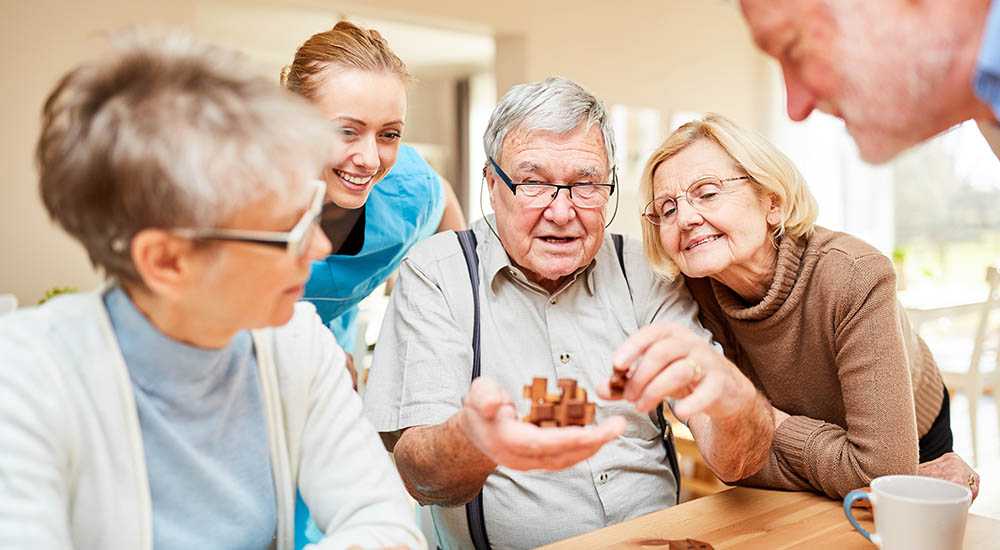
Although a person living with dementia can experience a range of physical deficits, it’s memory issues and cognition changes that stand out the most to caregivers. A person who was once very talkative may now struggle to follow along with a story or get frustrated by word loss when speaking. When conversation becomes challenging, friends and family may be unsure of how to continue fostering the relationship. In fact, it’s common for loved ones to reduce visits to the assisted living facility or stop going altogether as the dementia progresses. They’re likely thinking, She doesn’t recognize me anymore, so there’s no point in visiting. In cases when the patient still lives in the family home, interactions might start to become limited to basic personal care, as the family is not sure how to engage.
These factors lead to the biggest complaints from people who are living with dementia: feelings of loneliness and boredom. Maintaining social connections for these individuals is imperative, but how to do so leaves many caregivers at a loss of what to do. As the needs and abilities of the patient change with the dementia’s progression, care partners will have to adjust methods to connect in new ways.
There’s a saying passed around the caregiving community that goes, “People will forget what you said, but they will never forget how you made them feel” (originally attributed to Maya Angelou). The applicable wisdom here is that a person with advanced dementia may not be able to identify a loved one by name or relationship, but they can associate a visitor with kindness and feel loved. This is because the brain’s amygdala—the part associated with emotions—typically stays intact throughout the dementia journey.
To engage with a nonverbal person or someone with cognition deficits, simplicity is the key to success. Start with known interests/pleasures and get creative in how you present these topics.
For example, consider a patient who was known to have been a lifelong horse enthusiast. Riding one is no longer possible, and let’s assume visiting a ranch or local stable is also not feasible. What we can do, however, is flip through a photography book of horses and appreciate them together.
Gardening may have been a favored pastime, though using tools and crouching down is not achievable. Perhaps design tabletop crafts that involve making succulent plantings or miniature gardens in teacups.
Even when not much about the person’s past is known, caregivers can still take steps to provide them with meaningful engagement opportunities. Music from the person’s younger decades is often successful at boosting mood. Chaperoned strolls outside or sitting in a garden provides a change of pace and scenery.
Dementia expert Teepa Snow teaches that the most important thing to understand about meaningful activities is that a person with dementia needs more than just entertainment. Activities like watching TV or having too many visitors may cause overstimulation and result in fatigue or agitation. Instead, there needs to be balance of four areas that are important for all human beings: work, self-care, leisure, and rest.
We must change our expectations as the disease progresses. What works today, might not work tomorrow—and that’s okay! Almost all people living with dementia can be engaged in a meaningful activity, even in late stages, so trying different approaches is critical. People with dementia cannot make a schedule to live by, plan activities, or solve problems themselves. It is the job of their care partners to do it for them. The benefits of improving well-being and reducing loneliness and boredom will significantly improve the quality of life for both people with dementia and their caregivers.
Click here for some great ideas in planning activities for dementia patients.
You might also like to read:
What is sundowning?
Dementia and the Brain’s Emotional Center
Starr Hospice’s Dementia Services